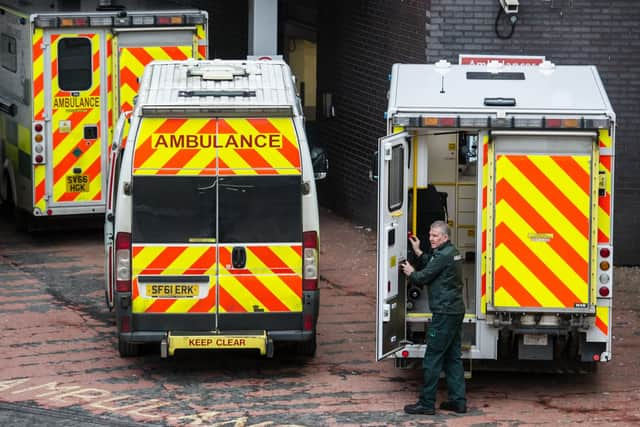A&E waiting times: Leading health professors call for better data gathering following Scottish Government data revelations
Andrew Biankin, regius professor of surgery at the University of Glasgow, and David Kerr, professor of cancer medicine at the University of Oxford, have penned an open letter to the Scottish Government, insisting if the NHS is to “prosper in the face of the immense pressures it faces today”, then accurate data must be collected across the UK.
The letter comes after The Scotsman exclusively revealed up to 2,000 patients a month are being “deliberately hidden”, according to a whistleblower at Glasgow’s Queen Elizabeth University Hospital (QEUH).
Advertisement
Hide AdAdvertisement
Hide AdAt NHS Greater Glasgow and Clyde (NHSGGC), the health board that runs QEUH, just over 6,000 patients are seen in A&E each week, with 71.3 per cent of those patients seen within four hours.


However, the health board says Scottish Government guidelines require it to submit data on the Acute Assessment Unit (AAU) at QEUH separately to its A&E figures, despite the two fulfilling basically the same function.
The letter reads: “We believe the NHS is stronger when it is closer to the communities it serves. Scots benefit from the fact our NHS is run from Scotland. But we also believe we will all benefit from better joint working, with seamless data sharing across the United Kingdom – operating for individuals who need transfer of their personal medical records across the devolved nations, and for populations, permitting exploration of disease patterns.
“With improved data sharing on health outcomes and treatment, the UK NHS can be turned into a ‘policy lab’, where learning and progress in one part of the UK can be used to improve care in other areas of the nation.
“Furthermore, combining the data of 68 million people across the UK would allow us to understand far better how new treatments work and who would most benefit from them.
“In Scotland, the accuracy of waiting times data is already facing questions, amid claims by some that the system is being ‘gamed’ to reduce the scale of the crisis. This benefits nobody. We therefore call on the UK and Scottish governments to work together to harmonise more medical data so we understand the causes and nature of disease better.
“As Bacon said, ‘ipsa scientia potestas est’ – knowledge itself is power – but we believe that the true power of knowledge is in its sharing.”
Prof Kerr was the author of a major report published in 2005, commissioned by the-then Scottish Executive, on reforming the NHS in Scotland to deal with overall poor health, health inequalities and an ageing population.
Advertisement
Hide AdAdvertisement
Hide AdA Scottish Government spokesperson said: “Robust data is vital to improving performance across all health services.
“We expect all boards to comply with guidelines for recording waits against the four hour target, which covers attendances at all types, including in trolleyed areas of assessment units. We have contacted boards to seek assurance this is being adhered to.
“Our planned care waiting times data meets national guidelines and we will continually explore how we can better improve our data collation and publication.”
Comments
Want to join the conversation? Please or to comment on this article.